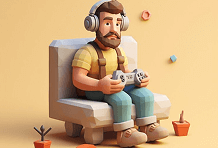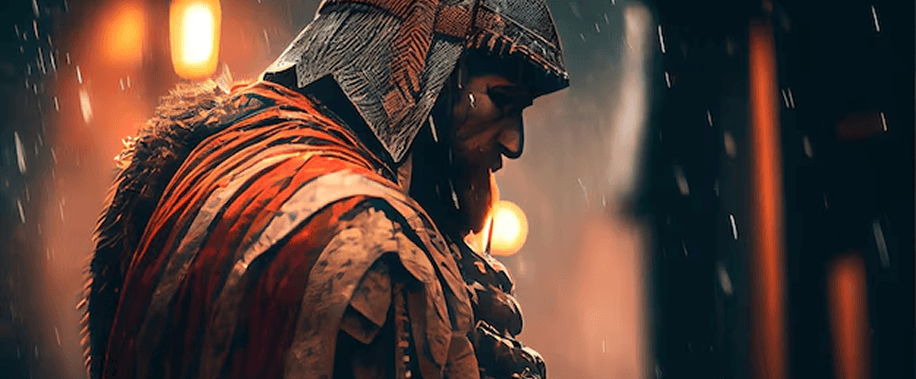
3D Game Development
Next-Level 3D Gaming With Expert 3D Game Development Company
Ever wondered what goes into creating a 3D video game that’s both visually stunning and incredibly fun to play? Why not start your 3D game development with our industry experts.

12+
Years of Expertise
50+
Projects Completed
10M+
Game Downloads

Our Complete Suite of 3D Game Development Services
Of course, you always need full-fledged and most reliable 3D game development services. We've got you covered. An experienced team at our company is ready to develop amazing 3D game development experience for gamers across the world.
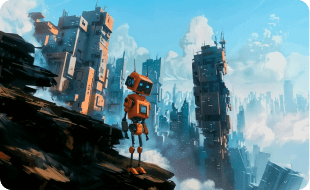
3D Game Development
Bringing extremely efficient, rich multimedia gaming experiences that are based on high-end engines and designed with bespoke tools and modern methodologies in various platforms.
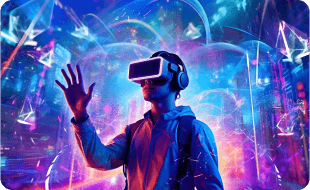
Open World 3D Games
Our team constructs expansive open-world environments filled with detailed terrains, interactive storylines, and AI-driven characters for true exploration freedom.
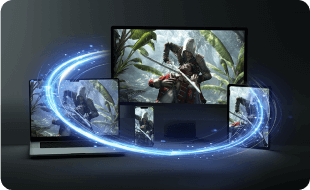
Isometric 3D Games
We design and build isometric 3D games with perfect angular viewpoints, which are most suitable for strategy, simulation, and adventure games.
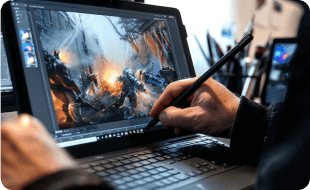
Cross-Platform Integration
Your 3D game can be easily targeted for the PC, the consoles, mobile and web platforms which make the game more pervasive and playable.
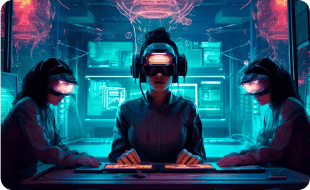
Post-Launch Game Management
From real-time updates to user engagement tools, we manage post-launch support and provide you with high player retention and satisfaction.

Rapid Game Prototyping
We enable fast validation of ideas using clickable 3D game models where there is always space for testing before the project’s formal development is complete.

3D Game Porting Services
Our porting team facilitates this well, seeing to it that your existing games are as good as possible on the new platforms, with playable controls and visuals.

Character Modeling & Rigging
Creating interesting characters for interactive and long-time engagement is our expertise. We maintain flexibility of rigging to suitable narrative and interaction.

Environment Art & 3D Assets
The artists in our team create photorealistic and beautiful environment art design and 3D objects, making the games’ environments stunning.
Our 3D Game Expertise
Why Choose Our 3D Game Development Studio?
Looking for a team that blends creativity with cutting-edge tech to build stunning, scalable, and high-performing games? Our firm specializes in 3D game development, which involves a combination of creativity and state-of-the-art technologies to create attractive, efficient, and expandable games. The 3D Gaming Technology Market is projected to grow from USD 46.10 Billion in 2025 to USD 172.80 billion by 2034. Whether you are going for open-world, bitmap, or any other concept, you can find related gaming experiences here.








Bring Your 3D Game Vision to Life: End-to-End Development Process
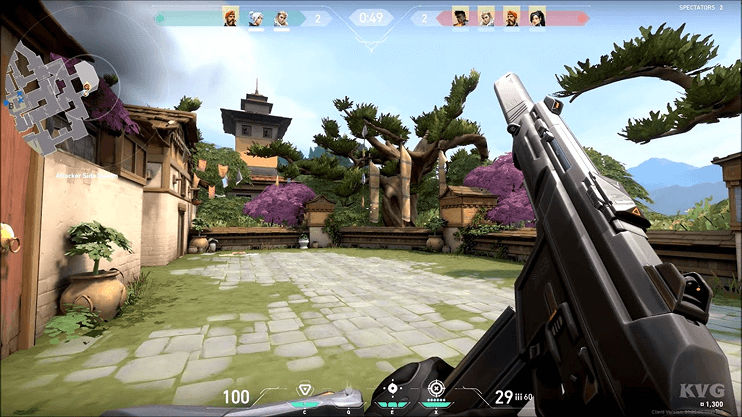

Ready to Build Your 3D Masterpiece?
Step into the future of 3D gaming with StrikeOneStudios—your expert partner for Open World 3D, Isometric 3D, and next-gen visuals. Reach out to us and let’s craft a game that players will never forget!
Get Started

Getting Started with 3D Game Development

How Much Time Does It Take to Develop a 3D Game?
It may take roughly two months approximately to create a non-complex 3D game that has simple features, irrespective of the type such as the Open World 3D, Isometric 3D and so much more, and the depth needed in that particular game. Depending on the type of game, the production process can take the following time: A simple 3D game might take 3-6 months; An open world or isometric with rich possibilities – 12-24 or more than that. Such stages consist of the concept development stage; the pre-production stage; the development stage; the testing stage; and the launch stage.
For Open World 3D games, the duration is slightly longer because of the scope of environment, nonlinear concept, complexity in the AI and inclusion of other factors such as; weather conditions, day and night cycle and the ability to explore on the map.
Such games have massive amounts of world-building, detailed modeling and multiple layers of interaction which simply require more hours for development. The design team requires some extra time to provide the feeling of living and interconnectedness into the game, enhancing time spent on development.
Isometric 3D games, however, have quite shorter development time comparatively to 3-person perspective ones but these ones also need a lot of work. Isometric views require unique camera perspectives, layering of environment, and the objects in the views should be scalably incorporated.
Such games do not necessarily comprise large worlds comparable to those of the open-world games; nevertheless, they presuppose elaborate design solutions and well-developed graphics to guarantee the high level of disastrous usability and functionality. The time taken would depend on the numeral character, levels, level of interface, core commands and other special features.
How Do 3D Game Development Services Add Value to My Gaming Project?
Wondering how to bring more depth, interactivity, and immersion to your game? Outsourcing 3D game development services helps in adding depth and interactivity to your game and creating an immersive environment for users. 57% of total video gaming revenue comes from mobile games. Whether you’re designing an Open World 3D game, an Isometric 3D strategy game or a visually intensive simulation you can always benefit from the professional help of a 3D game development team.
- Immersive Player Experience
- Versatile Game Genres & Platforms
- Future-Proof Investment
- Customization and Support
Games created through three-dimensional technology pose a number of advantages and one of them is that they can provide good immersion. In contrast to 2-dimensional graphics, 3D displays depth perspective and motion that can be felt and appreciated based on human understanding and experience.
There is versatility in the development of such game types as far as genre and platforms are concerned. Being able to apply 3D environments to all sorts of views ranging from open world to tiny isometric provides a good compatibility with any type of game. This means you can reach out to more players while ensuring that the quality and the performance is not compromised.
Hiring professionals to develop a 3D game means preparing the project for future advances in the industry. Due to the increase in popularity of the VR/AR and better graphics cards, 3D games should be more scalable than they are nowadays.
There are always specific types of services that professional 3D game development companies offer, which may correspond to the vision of the particular project. You will find appointing a web designer helpful when it comes to planning, to be tested frequently with technical help always available after installation.
In short, partnering with a 3D game development studio not only enhances your game’s quality but also strengthens its marketability and longevity.
What Are the Key Benefits of Outsourcing 3D Game Development Services?
Today, outsourcing of 3D game development has become a common phenomenon among most game publishing companies, start-ups, and even triple-A studios. There are several reasons for this including; access to talent which enables one to contract outstanding individuals, and cheap production to name but a few. But if you are planning to design an Open World 3D game, Isometric 3D experience or any graphical game, better outsource the project.
- Access to Specialized Expertise
- Professional 3D modelers and texture artists
- Developers experienced with Unity and Unreal Engine
- Experts in open-world navigation, isometric view, and real-time rendering
- Dedicated QA testers for smooth gameplay
- Faster Time to Market
- Parallel task execution to reduce bottlenecks
- Agile development processes for rapid iteration.
- Frequent updates and milestone-based tracking
- Quick scalability for large or urgent projects
- Cost Efficiency
- No overhead costs like salaries, office space, or hardware
- Transparent pricing models—hourly, fixed-cost, or milestone-based
- Budget flexibility depending on game complexity
- Flexibility and Support
- Ongoing post-launch support and LiveOps services
- Support for multi-platform porting
- Scalable teams to meet changing project demands
- Testing and Quality Assurance
- Bug fixing, stress testing, and player feedback adjustments are essential for a polished game.
- Estimated cost: $20,000 – $100,000.
- Marketing and Launch
- Successful MMORPGs require aggressive marketing, influencer partnerships, and promotional events.
- Marketing costs can range from $50,000 to several million dollars.
The first objective for outsourcing 3D game development is the fact that it avails a pool of skilled talent for the business. They are made from game designers, developers, artists and animators who ought to have good inkling of game engines, platforms, and designs.
This level of specialization may be difficult or costly to build in-house.
Outsourcing effectively reduces the time taken in the development process as well. Because experienced studios know best the most time and cost-efficient ways to manage projects and which tools should be used in it they can manage to complete the project much faster.
Getting your game to market faster can mean beating competitors and capturing more players.
Outsourcing a complete team may be costly and resource-consuming when one is running a full in-house 3D game development. Outsourcing is the best way to maintain low expenditures while having incredible quality.
This helps you allocate resources more strategically, especially during early-stage development.
Outsourced teams allow for a lot of flexibility depending on the change in requirements of a game. They are expected to work under external pressures and tendencies focused on the scope, design or refinement opinions.
What Factors Influence the Cost of 3D Game Development Services?
TThinking about the budget for your next 3D game? The truth is—there’s no one-size-fits-all answer. The cost of 3D game development also depends on factors more notably when creating complex games such as Open World 3D or Isometric 3D games. Even when it comes to budgeting, many companies set it early. However, there is no specific fee or any standard which is applicable to all the businesses. There are the platform requirements, the art style, complexity and the features which will be incorporated into the final project that defines the budget.
- Game Type and Complexity
- Open World 3D games are ranked high in terms of cost to develop. They demand huge maps, realistic weather, intriguing and complex AI characters and non-linear narrative structures.
- Isometric 3D games are typically less expensive compared to the other types but they still include such things as complex graphic artwork, fixed grid interface and special game interfaces.
- Platform and Device Compatibility
- PC
- Consoles (PlayStation, Xbox, Nintendo)
- Mobile (iOS and Android)
- Web
- VR/AR devices
- Art Style and Asset Production
- Character modeling and animation
- Environmental design
- Texture mapping and rendering
- VFX (visual effects) and lighting
- Features and Functionalities
- Multiplayer support and matchmaking
- AI behaviors and pathfinding
- Custom physics or in-game mechanics
- Inventory systems, dialogue trees, or quest management
- In-game purchases and monetization systems
- Development Team Size and Location
- In-house teams in countries like the US, UK, or Canada typically charge more due to higher hourly rates.
- Outsourcing to other areas such as Eastern Europe, India, or Southeast Asia will help bring down the costs of development without compromising the quality.
- Freelancers or smaller studios may offer lower prices, but scalability and long-term support might be limited.
- Timeline and Production Duration
- Basic Isometric 3D Game: $15,000 – $50,000
- Mid-Level 3D Game with Moderate Features: $50,000 – $150,000
- Open World 3D Game: $200,000 – $1M+
The scope of your game is the most important cost driver. For instance:
Simple puzzle games or casual arcade titles are cheaper because they have fewer mechanics and minimal asset requirements.
The more platforms your game supports, the higher the development cost. Games can be built for:
The control mapping for each platform might be different, and so the procedure of optimization and its quality assurance. The most heinous drawback is that developing for different platforms can substantially add to the overall cost of development, especially if one were to develop a high performance 3D game.
In 3D games, visual assets are often custom-built. This includes:
Realistic and high definition 3D assets demand time and many skilled workers, which makes them costly to develop. The current Open World 3D games may require thousands of detailed assets which has to be included in the game while Isometric 3D games may have slightly generalized or top-down art, but the assets must be highly defined that at least they are slightly complex.
The number and type of features you want to integrate will directly impact the budget. This includes:
Each feature adds hours (or even weeks) of development, testing, and integration.
Costs also depend on who you hire:
It’s essential to find a balance between affordability and quality.
Shortening the timelines of a project in an organization has proven to be effective in increasing the expenses required in the project. A large-scale Open World 3D game may take 12 to 24 months or maybe more, just primarily for designing alone, coding, testing and polishing aspects. Generally, the proportion is proportional to the amount of time spent as well as the number of people in your team.
Estimated Cost Ranges
These are just general estimates. A precise quote requires a thorough scope analysis.
What Should I Prepare Before Partnering with a 3D Game Development services?
Starting a 3D game development project is inspiring, however, to achieve the best result in cooperation with a development studio, it is necessary to prepare. Understandably, the outcome of conceptual planning is to have a better idea of the game’s direction and specific objectives to foster a clear vision of the final product, avoiding inaccuracies and inefficient working methodologies.
Here’s what you should consider preparing before initiating the partnership:
- Define Your Game Vision
- Genre (e.g., RPG, strategy, action)
- Core gameplay mechanics
- Target platform (PC, mobile, console)
- Art style preference (realistic, stylized, isometric, etc.) Even a rough vision document helps developers understand the creative direction you want to go in.
- List of Key Features
- Customizable characters
- Real-time combat
- Day/night cycles
- Online multiplayer This helps scope the complexity and prioritize development milestones.
- Know Your Budget Range
- Gather References or Inspirations
- repare for Collaboration
Start with a clear idea of what your game is about. Think about:
Regardless of whether a project is Open World 3D or an isometric strategy game, it is possible to list the elementary features that cannot be omitted. Examples might include:
It is not required to have numerical targets but a range will help the development team to suggest technologies, manpower and time which is feasible with your budget. 3D game development differs from one another based on its type and difficulty level.
Reference games, art styles, or UI/UX preferences can serve as a visual guide for developers. It’s helpful if you can say, “I like the combat system from Game X” or “the visual style of Game Y fits my vision.”
Be ready for back-and-forth communication. It is important to understand it, as well as the continuous process it is, rather than a one-time handoff. Being able to provide answers promptly after being asked, participate actively, as well as embracing professional opinions that may be given by the technical team is very helpful in creation.
Ready to build your 3D game world? StrikeOneStudios is here to turn your ideas into an immersive reality — from open world exploration to isometric strategy. Let’s create something unforgettable!
FAQ
Answers to the most frequent question.

Build Interactive Worlds with a Reliable 3DGame Partner
Let’s turn your vision into a reality. We specialize in developing dynamic, high-quality 3D games tailored to your goals.








